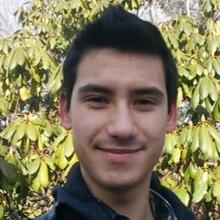Why did you choose to pursue graduate studies at the University of Waterloo?
I was interested in learning about bioengineering and synthetic biology. The expertise of my advisors, the reputation of the university, and proximity to family were primary motivators for pursuing my PhD at UWaterloo.
 Describe your research and what makes you passionate about it:
Describe your research and what makes you passionate about it:
Individual genes determine how individual microbes behave, and individual microbes determine the processes the community carries out. Therefore, I am investigating how to install or remove genes from microbiomes in a rational manner. Controlling the functionality of entire microbiomes has wide-reaching applications in environmental remediation, healthcare, and the bioeconomy. The interdisciplinary challenges, the potential impacts associated with microbiome engineering, and the great people I work with provide me inspiration to give my best every day.
Tell us about where you are from:
I was born in Ottawa but grew up overseas in Italy and Belgium (grades K-12). I earned my B. Eng. and MASc from the Department of Process Engineering and Applied Science from Dalhousie University. Given my somewhat frequent moving rate, I usually say the last place that I was living is where I'm from.
What is the best part about being a grad student?
It used to be all the free food and snacks, but then COVID happened. But on a more serious note, working in an intellectually stimulating environment with other great minds is a great part of being a graduate student.
Tell us about what activities, groups, events you are involved in
I compete for the varsity tennis team, and I play the drums for the Kitchener Musical Society Band. I am also involved in the Chemical Engineering Graduate Student Association. In 2020-2021, I regularly volunteered in STEM outreach activities for Women in Engineering. I now share my passion for science with kids and adolescents through the Skype a Scientist program.
What campus services have you accessed and how have they been useful to your academics or your well-being as a student?
I use the library services very frequently. They provide me with practically unlimited access to reading, both for research and recreation.
How has grad school helped you develop your teaching skills?
Normally in grad school, you get plenty of opportunities to assist in teaching courses. I have been very fortunate to have opportunities to mentor co-op students and interns. This has helped me develop a lot of people skills that are hard to learn through other means.
Do you have any highlights or successes to share about your teaching activities/roles?
When I was a TA at Dalhousie University, I would like to believe that I helped several students make it through some tough theoretical concepts in heat transfer and succeed where it mattered most. In the end though, the students deserve all the credit for their successes.
How do you spend your free time?
I am usually out training on the tennis courts, playing music, cooking, and spending time with my partner and my two calico kitties.
What advice do you have for new graduate students?
Do your graduate degree if you are passionate for what you are doing; succeeding in something that you care about is much easier. And be patient, mistakes are inevitable in research. You will experience failures, no matter how clever you are. I can't speak for all graduate students but can say that I've gained my smarts by doing a lot of stupid things.
What are your plans once you finish your education?
I plan on working in an environment where I can make an impact on my community and society in general. I will be content as long as I'm doing good things for society and the planet, whether this is in the form of being a professional engineer, a professor, or a research scientist in industry.
What are some of the challenging aspects of being a graduate student and how do you address these challenges?
The projects you have to do can be daunting; there is just a lot of work involved with putting out quality research. I remind myself that I don't have to complete a PhD, I need to complete a few tasks today, tomorrow, the day after, etc., and the PhD will take care of itself.
Do you have anything else you’d like to share that is interesting about yourself?
I used to study fire and fluid dynamics at Dalhousie University. Now I watch fluorescent bacteria grow under the microscope. How the turn tables.
Country of origin: Canada
Domestic or International: Domestic
Academic stream: Research
Full-time or part-time: Full-time
Research supervisor: Marc G. Aucoin, Brian Ingalls
Graduate student awards held: NSERC CGS-D, Engineering Excellence Fellowship
TA/RA or GRS held: TA/RA




